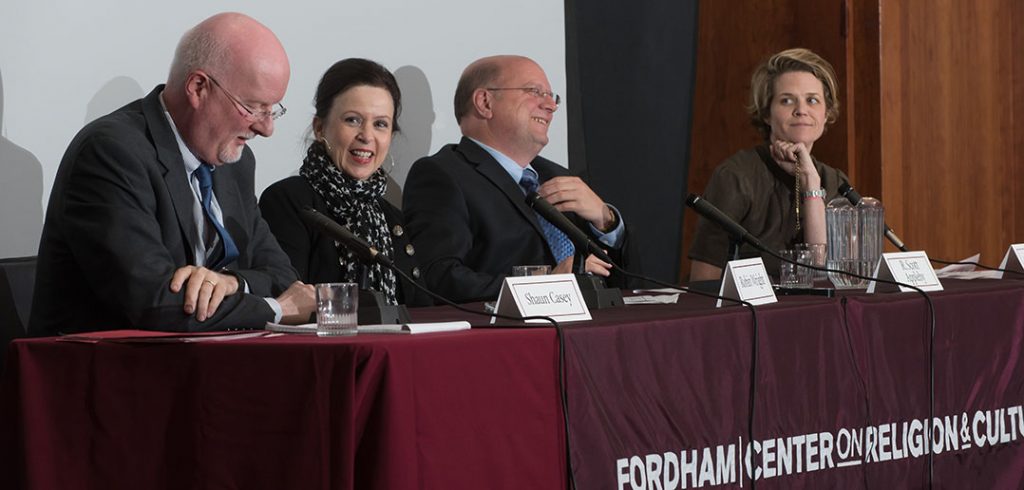“Peacebuilding is not kumbaya; it’s a professional practice in the world.”
With a bold statement that religious communities are not peace builders, R. Scott Appleby, PhD, the Marilyn Keough Dean at the University of Notre Dame’s Keough School of Global Affairs, incited panelists on April 15 to debate religion’s role in fostering peace.
The panel, “Beyond Extremism: Reclaiming Religion’s Peacebuilding Capacity in an Unstable World,” was sponsored by the Center on Religion and Culture. Author Eliza Griswold moderated.
Appleby framed the evening’s conversation around four theses, beginning with the abovementioned idea that religious communities and most religious leaders are not peace builders.
He said most religions remain concerned primarily with building and educating their flock. The real work of peacebuilding requires “substantive and technical abilities … for conflict meditation, negotiating tactics, reduction of violence, and post-violence reconciliation,” to name but a few.
This doesn’t negate the role that religions can play in peacemaking, he said. Indeed, professional peacemakers find natural allies in religious communities. But the media’s “incessant drumbeat” on religion’s role in extremism and conflict can complicate the relationship.
“It increases the [religious leaders]level of mistrust of outsiders [and]deadens whatever momentum these communities might have toward interreligous peacebuilding,” he said.
Appleby continued on with his next three points: Most post 9/11 governmental efforts at engaging religious actors and communities in the United States and abroad have undermined religious peacebuilding; Radical Islam is about Islam, and; Interreligious dialogue, conferences, joint statements, and ceremonies are the “parlor games” of those not sufficiently serious about religious peacebuilding.
Robin Wright, a journalist and foreign policy analyst, took issue with Applegate’s points beginning with his first statement. She said she traveled some years ago with Pope John Paul II to the Philippines, where she witnessed him confront Ferdinand Marcos. In Brazil she watched him rally nearly one million trade union workers, empowering them to challenge the military government.
“Some religious leaders are more adept than a lot of our political leaders, and they do it for a lifetime—not for a political cycle,” she said.
Wright concurred that conferences and ceremonies do little to promote real peace and agreed that government efforts at engaging religious communities can undermine peacebuilding.
“That’s not the business of government,” she said, particularly in a secular society that does not always know how to engage in dialogue.
“We become too vulnerable to the central flaw of U.S. foreign policy—that we always look for mirrors of ourselves,” she said.
Shaun Casey, special representative for the Office of Religion and Global Affairs at the U.S. State Department, took issue with Wright. His office of 24 professionals is tasked with bringing understanding of world religions to the department’s global posts and bureaus. His office also advises Secretary of State John Kerry on policy as it relates to religion.
“I don’t [think]we always look for the mirror of ourselves in order to engage,” said Casey, who added that, in all his global travels he runs into very few “low church Southern Protestants.”
Casey said there is a “very high price” paid, both financially and in American lives, if the United States is “willfully ignorant” of other religions.
“Our government is in fact going to engage with [different]religious actors. The question is, do we do it in a sophisticated way or we do it in a way that caricature?”

